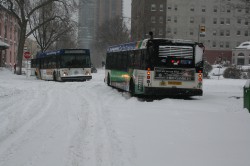County Officials Delay Solving Bus System’s Woes
Contractor chosen would save taxpayers $15 million a year. So why the delay?

These buses are as stuck as the current bidding process appears to be to manage MCTS. Photo by Jeramey Jannene.
Some day, we can only hope, the county will solve the issue of who will run its buses.
Back in July, Milwaukee County Executive Chris Abele announced the results of a bidding process to run the system, awarding the contract to MV Transportation, based in Dallas. That was six months ago and the contract remains tied up in delays by the county board and legal challenges by companies who lost the bid.
If you’re a taxpayer or a bus rider, it’s frustrating. The system has been declining for years. Buses on the street have dropped from 560 or so in 2001 to about 400 today, and service decreased 20 percent while fares increased 50 percent during that same period. The state has slashed its funding for this by some $14 million over the last two budgets and the county made up the difference with federal funding, but that funding has now been eliminated.
Meanwhile the system has been run by the same nonprofit company, Milwaukee Transport Services, Inc. (MTS) for nearly 40 years. Since at least 2011, county supervisors have expressed frustration over the failure of MTS to modernize the system with improvements like paper-less transfers. In 2012, numerous supervisors voiced complaints, with Jason Haas imploring the company to “please try harder” to get this done in less than two years, adding “if this was a business plan, the two-year wait would be unacceptable.”
Supervisor Mark Borkowski railed about the “tortoise-like pace” of MTS while Supervisor Theo Lipscomb complained, “It would seem that we could have purchased a system already in use that could be replicated here far more easily than creating a new system and I think that’s why it’s taken up three or four years here.”
Then suddenly, just a few months after MTS lost the bid to run the bus system, it announced it was “taking transit to the next level” by adding an “Electronic Fare System” (ending the paper transfers), “Real Time Information” (informing riders where on the route the bus is at all times) and “Bus Stop Annunciators” (electronic signs and audio announcements of upcoming stops on all buses). In fact, it has only begun this changeover; this was mostly another promise to eventually incorporate these changes on all buses, a promise that goes back years.
MTS had also had problems running the county’s paratransit system (which provides rides for the disabled and elderly) which cost county taxpayers $8 million in added costs. The company admitted the screw-up in its application to the county during the recent RFP process: “There is no disputing the fact that the 2012 procurement [for paratransit] could and should have been handled more effectively,” it conceded.
Given the many problems faced by the system, it’s hardly surprising the Abele administration sought competitive bids from other companies interested in running the system. The winning bidder, MV, offered a price that would save taxpayers $15,3 million a year, money the Abele administration wants to funnel into service improvements.
The award to MV immediately created controversy, which was soon driven by two of the losing bidders, MTS and Veolia Transportation, who filed legal appeals challenging the decision. They argued that MV low-balled its administrative costs: it promised to spend $8.6 million per year versus $23.9 million for MTS and $29.4 million for Veolia.
MV’s bid meant its administrative costs would amount to about 4 percent of overall costs, versus the 14 percent now being spent by MTS and the 18 percent average for 14 similar-sized systems nationally, MTS claimed in its appeal.
The complaints by MTS and Veolia have generated considerable press coverage, including two different stories by the Shepherd Express assailing Abele for allegedly corrupting the RFP process. While board members have mostly said nothing, the feelings of many may have been expressed by Lipscomb, who told me that “the process may have been tainted in some way” and that Abele seemed to have “a distinct preference for a different business model than MTS.”
One problem with the idea that Abele manipulated the process is that the six-person panel which chose MV included representatives from the State of Wisconsin Department of Transportation and from the Milwaukee County Office of Community Business Development Partners, which at the time was answerable to the county board. In addition, there were four representatives from three other county departments: the Department of Transportation, Department of Administrative Services (two representatives) and the Department of Family Care.
Even if Abele did cleverly bend all these people to his will, no one has provided any evidence he has an animus against Veolia or any other of the bidders, other than MTS, which has frustrated many county officials. Rather he seems biased in favor of saving money for a system that is losing funding.
Veolia and MTS have tried to claim that MV will be allowed to increase its administrative costs later, but Abele’s lawyers, in their response to the appeals, shoot that theory down. The county Department of Transportation, it notes, “now has a New Contract with MV that is waiting for final approval from the County Executive and the County Board of Supervisors” and that “locks MV into the price proposal it submitted during the RFP process.”
The contract, the lawyers go on, “includes… heavy fines if MV does not fulfill its obligations. If MV performs below established performance standards, the County can deduct amounts specified in the performance schedule from the pre-determined management and administration fees. The New Contract also includes liquidated damages that may be assessed against MV if it does not provide the services contemplated in the New Contract.”
MV is not as big or as experienced in this field as Veolia, but Frenney notes it has won 200 contracts world-wide, about half of which are for fixed route bus systems, including 700 fixed-route and commuter buses in Los Angeles and fixed-route and paratransit buses numbering 700 in Orange County and 550 in Detroit. If MV tried to renegotiate or bail out of its Milwaukee contract, that would kill its reputation when it bids for future contracts.
Nor can it cutback service, because under the contract the county still sets the routes, fares and the like.
If there is any fear that makes sense to me, it’s that the company will recoup money it may lose on administration by seeking salary and wage givebacks from bus drivers. Frenney denies this, noting that MV “will honor all wages, benefits, seniority and pension for the MTS employees and retirees.” And Abele’s lawyers note that the contract provides incentives for exceeding performance standards, and requires MV to split any incentives earned with employees.
Meanwhile, what is the county board’s solution to the problem? As I’ve previously written, the board was supposed to create a review panel to consider the legal appeals by MTS and Veolia, but board chair Marina Dimitrijevic did nothing for months, until I made an inquiry regarding this, and within two hours of my emailed question, the board immediately announced that five county supervisors had just been appointed to serve as a committee to hear the appeal.
In theory, the panel cannot invalidate the RFP process unless it broke the laws, but this is not an assembly of judges doing the evaluation, and it’s not at all clear how much discretion this panel has. It will be fascinating to see what the panel decides.
Meanwhile, the board has already passed a resolution declaring it may take the bus system in house unless supervisors approve a contract with an outside vendor by April 1 (the board has a committee studying the issue). This could leave MV as well as Veolia and MTS out of the picture and would mean the county would take over management of the system. (The county has always retained ownership of the buses, buildings and equipment in the system.)
Odds are this would mean far higher management costs than MV proposes to spend. In fact, the costs could be higher than what MTS charged: the county originally outsourced to the nonprofit in 1975 in order to lower the costs. That, of course, would result in more cuts in service to a system that has been battered by more than a decade of such reductions.
Political Contributions Tracker
Displaying political contributions between people mentioned in this story. Learn more.
- April 30, 2019 - Marina Dimitrijevic received $100 from Jason Haas
Murphy's Law
-
National Media Discovers Mayor Johnson
 Jul 16th, 2024 by Bruce Murphy
Jul 16th, 2024 by Bruce Murphy
-
Milwaukee Arts Groups in Big Trouble
 Jul 10th, 2024 by Bruce Murphy
Jul 10th, 2024 by Bruce Murphy
-
The Plague of Rising Health Care Costs
 Jul 8th, 2024 by Bruce Murphy
Jul 8th, 2024 by Bruce Murphy


















My problem with the bidding process is simple. It’s like buying a Rolex from a guy sitting in a bar. The “winniong” proposal is just too good. In my experience, if it’s too good to be true, it probably isn’t.
First operational principle. Publicly traded corporations have written in their charter that their first responsibility is to return a profit to their stockholder.
MV officials have stated at public meetings that their low ball bid reflects a marketing strategy to establish themselves in this market and attract other business. That puts our bus system right up there with selling the hot dog buns at cost and hoping the customer will also buy the hot dogs from us. By the way, after the holiday prices return to normal. Why does MV leave in their proposal the expectation of renegotiation once they win the contract?
Second Operating Principle. When you purchase a product or service you have three points of consideration. You have to chose, the lowest price, best service or the highest quality. You cannot have all three. you only get to choose two.
While I think that we should have had all of the great amenities that the MTS is developing for our system. MTS, in a very hostile atmosphere and shrinking budgets, decide to keep as many buses on the street and run as many routes as they could.
After all, is their mission to provide bus service or have all of the very nice but in the end not necessarily the amenities that many modern systems offer?
If we were the Twin Cities, Seattle, Portland, Vancouver, Huston, Salt Lake or Washington DC, our politicians would voting for funds to build , expand and grow their public transit system as part of Regional Plan to integrate transit options.
But sadly we are modeling ourselves after Atlanta. After what they went through this week while experiencing a modest snow storm in their area. Because of a mass exodus of workers from the city to the suburbs at the height of the storm. They clogged the highways and caused many to have to abandon their cars on streets including the interstate. It was pointed out that part of the problem is the lack of adequate mass transit to relieve the problem of rush hour traffic.
Bruce, if people want to buy the horse-pucky that MV and Abele are shoveling out as public information it’s fine. But I for one want the Best Service and the Highest quality.
I agree with Jeffrey Jordan. MV “says” it will not make devastating cuts to drivers’ and other employees’ salaries and benefits (such as their pensions), but there’s nothing in the contract to ensure that doesn’t happen. And, as Jeffrey points out, they’ve admitted they low-balled this contract offer in order to get bigger, better contracts in other cities. Yes, it’s true. MTS has not always handled the system management in the best possible way. What I’m curious about in all this is how the management employees of MTS are hired. It’s a non-profit set up by the County in 1975. Is there a board of directors? There’s just so much going on under the radar, so to speak, that it’s difficult to know who truly has the best interests of the riding public — myself, included, for more than 50 years — at heart. As Bruce points out, many other cities who truly value public transportation have gotten it right. I’m not sure Abele would be on the list of honest public transportation supporters. It seems he’s using dollar figures to say, “Hey, we can save money here,” rather than looking at the big picture. When was the first, last or ever time Abele rode the bus? Even for show?
Good comments by Jeffrey and Peggy so I will not repeat them.
It is almost impossible for anyone of us to make a fair evaluation of all the bids unless we see what the request for proposal looked like, and the responses from the bidders. I have been on teams over the decades that has evaluated proposals and service contracts. Sometimes comparisons are extremely difficult and the process of evaluation is supposed to be objective as possible.
As public records, I would like to see the evaluation sheets and the supporting documents. It is easy to say this will save $15 million dollars. What is that claim based on and what does it mean 5, 10, 15 years out and what will the system and quality look like?
I do not believe Abele and his team have much experience with transportation services, they probably never rode a bus, and I do not trust an out of state for profit business from Texas. I do not like the idea at all of profits from our Metro area business leaving the state of Wisconsin. This is another siphon from the local economy. Does the $15 million savings come from the wages and benefits of workers that live here? That is no real savings.
That is why the only way to fairly compare the bids is to review all the documents and have an expert that understands transportation systems as part of the evaluation team.
I agree with the above statements that it’s impossible to judge the bid since we haven’t been able to see it or the RFP.
“As Bruce points out, many other cities who truly value public transportation have gotten it right.”
Most of those cities have complete public ownership and management of their systems with more transparent management structures. I don’t know that bringing the system completely in-house would be a bad idea. At least we’d know who was in charge of what and how to influence them.
Bruce does not speak for this bus rider when he claims – about delays in transit negotiations – “it’s frustrating.” I welcome these delays because the full story has a chance to be heard in public. I thank Bruce for his interest in this issue. But it’s not about the money. If all bidders are equally competent, well, yes, you can pick the lowest bidder – case closed; let’s move on. But that issue of competence continues to emerge in public discussion of MV’s proposal. Can MV fool the public that it can manage the system for nothing?
Give Urban Milwaukee an A for pointing to the dollars, but for choosing a manager, Bruce runs his bus on the sidewalk. Bruce is (or should be) acquainted with the commentary that has surfaced about MV’s management.
One audit of MV was conducted (in Florida) by Lake County’s Clerk of Circuit Court Internal Audit Division, and was published June 14, 2013, six weeks before MV was selected (July 29, 2013) as County Executive Abele’s choice to manage Milwaukee County Transit. The audit is available: https://www.lakecountyclerk.org/forms/internal_audit/report/2013/BCC-109_Audit%20_of_MV_Transportation_Contract.pdf
When I asked about the Lake County audit in a meeting with three MV representatives, the Vice President of Business Development invited me to a private discussion of the audit. I accepted and sent him a reminder. That was over 3 months ago.
For eight years in Lake County, Florida, MV’s touted management team has operated a small bus service with a budget in 2012 of $9.5 million (of which MV took $3.5 million). They had since 2005 to take control of money, fuel buys, farebox, scheduling issues, privacy concerns, and paperwork. Then came the audit identifying eight issues that point to MV management and the Lake County Board that hired MV.
Manipulating “… trip data to maximize revenues from funding sources…. [in] May 2012, the funding sources of … nearly 38 percent were altered.” Did management allow this? Indulge it? Encourage it? Or not know about it?
“Contractor fueling practices are not in compliance with established procedures, are inefficient, preclude proper analysis of usage and appear to be abusive. Some odometer readings on the billing are obviously erroneous, with some showing a reading in millions of miles….” MV buys fuel in bulk. Really?
“In addition, drivers may be sharing their personal identification number (PIN) and/or the vehicle’s fuel card.” Does MV management neglect to use standard tools designed to control costs? Is all that fuel being pumped into buses?
“The timing of fuel purchases… We … found that … 43% were in violation of the standard procedure [end-of-day fills]…. ”
“In addition, the quantity of fuel locations utilized by the Contractor’s drivers appears to be excessive, unnecessary, and possibly a result of poor planning. We noted that 105 different merchants were used for fuel purchases during a three month period reviewed.” MV’s pitch to Milwaukee is built around savings in tires and fuel.
“Personnel and client confidential information is not securely maintained. We found documents stored in a bathroom at the Contractor’s office…. documents commingled with trash in the public dumpster…. Contractor’s employees … do not segregate refuse that contains confidential information. No shredding policy…. The Contractor has a responsibility to protect the personal and confidential information of its employees and clients.” The most private information of paratransit riders and employees is in the hands of transit management.
Lack of controls on cash fares. Mishandling of personal information of those who qualify for paratransit. Records not updated. Inconsistent eligibility determinations. Medicaid trips are misclassified (placing the cost burden on the County instead of Medicaid – a problem MTS solved years ago). Temptation alert: by marking a van ride as a “no-show,” the driver who is handling cash may be tempted to pocket cash fares. Management control: fare cards.
MV in Lake County defines “on time” as within 15 minutes – late or early. “Using this standard … the County would report a 92% on-time performance rate…. rather than defining ‘on-time’ as up to 15 minutes early or late.” The practical bus rider who wants the 7 a.m. bus will appear at the bus stop by 6:45 a.m. and allow that the bus that arrives could be 15 minutes late to the destination. MV (not riders) considers that bus “on time.” The next bus in all of Lake County is one or two hours later.
MTS
Schedule failure in Milwaukee? MTS calls its drivers in for questioning if there are on-time performance issues. Late buses are not unusual in bad weather or during downtown parades. Otherwise, this bus rider finds the schedules reliable and makes travel plans accordingly.
MTS has a nearly 40 year history of efficiency, frugality, and determination to have the largest fleet of buses that are possible under the fiscal constraints of public transit policy. MTS excels in management. The issue at this cross roads is not management, where MTS excels, it is money. And that funding will not come from an out-state corporation. It will come from us once the state gets a transportation budget that serves everyone. http://urbanmilwaukee.com/2013/09/24/op-ed-in-defense-of-county-bus-system/
Hey, MV, want to be a Midwest winner? Well, MTS is the system to emulate if you want a foothold in the Midwest, but to replace it? Not this year. I’ll bet on the small company, managed by neighbors who use our bus, close to the heart of Milwaukee, but not a Goliath pretending to be a nonprofit.
Bill Sell,
You are a big supporter of MTS. We all get that. But the 15 minutes you talk about are the ADA Federal paratransit guidelines for scheduled pick-up. Every transit system in America has the same guideline. You are falsely trying to tell readers that MV can be up to 15 minutes late or early on fixed route buses. Shame on you for playing the same game as MTS trying to fabricate things. I too am a bus rider. We are tired of MTS.
Just like you Bill, anyone can turn on their computer and find “dirt” on any transit management company, such as Veolia, Frist Transit, MV and yes, your favorite, MTS. It’s called Google. Wow, lots of negative stuff on MTS. But you are well aware of that.
Chris,
Thank you for the passion for good bus service; we need more of that. To clarify: I did not invent the 15 minute rule or misuse it from a paratransit standard to fixed route transit standard, as you suggest.
Paratransit is not fixed route transit. Paratransit riders need to call for a ride. A 15 minute rule for paratransit is not practical. Calling a day ahead is often recommended.
If you read the audit text (copied below), you will note the auditor’s point is about “fixed route observations” and that the auditor finds its use here by MV on fixed routes with one-hour headways as “questionable.” The math for a bus rider trying to be on time bears this out.
I did not invent the audit, I read it.
” During our review of the County’s fixed route observations, we found that the buses are not timely in accordance with the published schedules. In fact, out of 89 recorded times we determined that they were late 68% of the time. The County measures its on-time performance based on a standard of 15 minutes or less after the scheduled time. Using this standard, only 2 of 25 times recorded on a particular day would be considered late and the County would report a 92% on-time performance rate compared to our 20%. We find that a 15 minute standard is questionable considering the routes are only one hour long and that a 25% difference from the arrival or departure time is excessive. If management desires a goal of 92% of their buses arriving within 15 minutes of the scheduled time, that is what they should state rather than defining “on-time” as up to 15 minutes early or late.”
Also, see: http://ntl.bts.gov/DOCS/manual.html
Please join me in getting a modern public transportation system for metro Milwaukee.
This discussion increasingly reminds me of arguments about choice and charter schools, where the underlying issue is one of governance, not what is best for the students, or bus riders. On one side are those who passionately believe public (or nonprofit) is good and private is bad; on the other side, those who believe that private enterprise is inherently better in all situations. I wish the county board was less hung up on governance issues and more concerned about how to update the bus system.
I’m glad someone actually wrote an article about this. My friend who doesn’t have a car and relies on the bus to get to work and back home has been recently complaining about the lateness of busses during this transition period to the modern age. She had to wait 45 minutes for the bus to arrive downtown after her shift ended at 10pm. Another friend from Chicago who didn’t know about our transit system had commented, “What is this Dark Ages BS?!” Truly, we’ve fallen behind on public transportation. Have you ever tried standing at a bus stop when it’s snowing/raining outside and there’s no bench or shelter? Or sadly, a shelter that doesn’t block out the wind properly at all. How about riding the 10 bus from downtown to home during the rush hour and everyone is squished uncomfortably inside since they’ve been cutting back on the number of busses on that direct route?
Note to some commenters above: the people employed by MCTS Transit Plus are very nice though and work really hard (at least whenever they pick up residents from the group home where I work at during the weekdays).
I hope the author of this article goes to the Metro Go event on Thursday and writes on how it went and other frustrations and hopes were voiced at the meeting!
Thanks for speaking out, Kim. Our bus system in Milwaukee County has been socked with budget cuts; this has meant route cuts. I, too, ride the bus and understand what you are feeling.
So what are e doing? Building a choochoo train to nowhere. Barrett easily could have talked Obama into letting him use it for buses.
The streetcar money can only be used for CAPITAL expenses. If it were re-directed to MCTS, it could be used to buy buses, but not to subsidize their operation.
MCTS doesn’t need to buy buses. It has enough. What MCTS needs is operating funds and, under federal rules dating back to at least Ronald Reagan, capital transit money can never be spent on operations.
The streetcar will also get City operating subsidies (but from parking revenue, not directly from taxes). There is no federal ban on using this money to subsidize MCTS, but it would be improper (in my opinion) for the City to directly fund a County program (like MCTS) on its own. The expenses of county programs should be shared by the entire county, not dumped on the poorest municipality.
The train to nowhere wil ahve to be subsidized. Money would be better put to bus programs. Barret should have tried to fix bus lines and get money for operating.
Choo choo will not get people to work.
I’ll add that in fact Mayor Barrett already got funding (from essentially the streetcar bucket) put into buses. The streetcar funding comes from an ISTEA allocation (that dates back to the early 90s) and part of the last and final deal on the money was to take about $35 million and use it for the buses. So in fact WCD he already did. Now, at this point if we don’t use it for the streetcar our money will end up in Cincy, KC, Salt Lake, Portland, Tucson, or a number of other cities working on similar projects.
So the answer to all of Milwaukee’s problems is to add another leech that takes no one nowhere and makes Milwaukee the laughingstock of the state.
@Tom D I don’t think it would be a bad idea for the city to directly subsidize some bus service at all. City residents make up the vast majority of MCTS riders and most of MCTS’s routes/route miles are within the city limits. Having the same people who are paying for parking garages, roads, and the streetcar, as well as making zoning decisions pay for buses might encourage the city to take them more seriously. They could even re-organize the oversight structure at MCTS to give the city a formal seat at the table. What’s going on in Seattle right now through the Bridging the Gap initative is a good example: http://www.seattle.gov/transportation/transit.htm